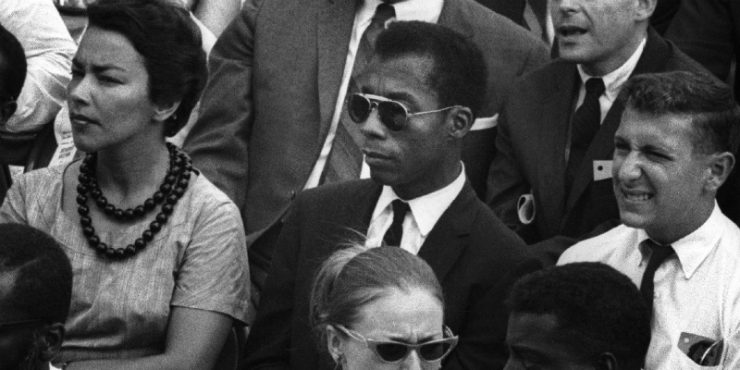The work of James Baldwin is exquisite, articulate and essential. That last part, the essentialism, is rooted in its passion and anger. His ferocity spilled upon the page with such beauty, but you could not have the beauty without the ferocity. He sidestepped verbosity for clarity. Everything he wrote and spoke for garnered him a reputation as a embittered negro for some and a revolutionary voice for others. As for the man himself, he saw himself as speaking very basic truths. The very idea that the things he said were viewed as controversial or groundbreaking speaks to the very necessity for them to be spoken. Baldwin never asked (nor Martin Luther King, nor Malcolm X, nor Medgar Evars) for anything other than the same liberties afforded to whites. It was their audacity to reveal the fear within White America that made them targets. It was the bravery with which they discussed the turmoil at the heart of our culture that made people afraid.
Baldwin did not suffer the same tragic end that met Malcolm, King and Evars, but he did bear witness to the tragic reality of blackness in America. Raoul Peck’s soul-shaking new documentary is based on the unfinished manuscript that Baldwin left upon his death at 65. The book, unofficially titled ‘Remember This House’, was meant to be an autobiographical document of those three men – Malcolm, King and Evars – but it was never published until now, where Peck has chosen to use Baldwin’s stirring words to illustrate an America rife with racial tension. In his masterpiece, The Fire Next Time, Baldwin wrote about the torrential occurrence of racial atrocity throughout American history. The only way peace can be found, he argued, was for whites to finally accept their culpability, to not allow time and incremental progress to free them from the burden of responsibility. To not allow their own lack of active prejudice to blind them to the sweeping prejudice of their people as a whole and America as an institution.
I Am Not Your Negro works upon that thesis and expounds upon it, showing its prevalence in American history from slavery to Ferguson, from Washington to Trump. Much like Ava DuVernay’s equally incendiary 13TH, Peck’s film will not budge on its views of white oppression. It will not take a second to console those who feel they are the “good ones”. It will not stop until you accept your role in your own history. Peck weaves throughout cinema, looks into the eyes of John Wayne, Joan Crawford, Gary Cooper and Doris Day, where the only idea of an American hero is white and virtuous, where the concept of race is dismissed or, even more likely, not even mentioned at all. We see the Wayne films in which his heroic characters admonish Native Americans massacred on their own land, the Day films in which whiteness itself is viewed as heaven on Earth. The convergence of whiteness and righteousness was a cultural fact of life in the American Twentieth Century, and this is the culture that Baldwin pushed against, a sisyphean struggle just to be heard.
The main highlights of I Am Not Your Negro, though, are Baldwin himself. His absolutely astonishing skill with both speaking and writing is showcased incredibly, whether it be giving a lecture at Cambridge or having a discussion on the Dick Cavett show, Baldwin is always conducting himself ever so amiably while barely shielding a boiling rage. We’ve seen the footage of Martin Luther King’s godly patience while people question his movement, and we’ve seen Malcolm X’s petulance when being cross-examined by skeptical whites. Baldwin was always viewed, first and foremost, as an artist, not as a political figure, but his art was always political. He had more social freedom than Malcolm and King, and was careful to exploit that advantage properly. Peck’s film is a perfect testament to an artist perfecting his ability to reach his audience with his point of view, to speak truth to power, to allow oppressors to understand that accepting your own hatred is the first step toward overcoming it.
The topicality of I Am Not Your Negro can’t be avoided, but Peck does not get bogged down in it because, like Baldwin, the film does not get distracted by the current moment. Baldwin did not speak to the past or the future, but simply asked his readers to accept the reality that is right now. It’s a battle still being fought today. Alongside 13TH and Ezra Edelman’s OJ: Made in America, this year’s Best Documentary Feature nominees are some of the greatest pieces of nonfiction cinema ever to discuss the American racial issue. It’s remarkable that we have three powerful, engaging films which such striking voices, attacking a topic so many Americans are eager to avoid, all getting massive exposure and support. To conclude, I return to the concept of essentialism. Calling any film essential brings along with it various biases, but like his books, Baldwin’s voice is essential if we ever hope to approach a future that embraces racial harmony at best and tolerance at worst. I Am Not Your Negro is essential viewing.
Directed by Raoul Peck










